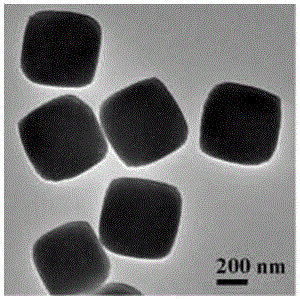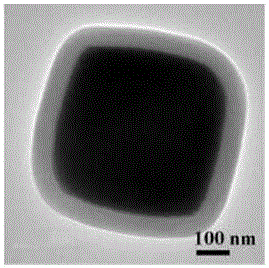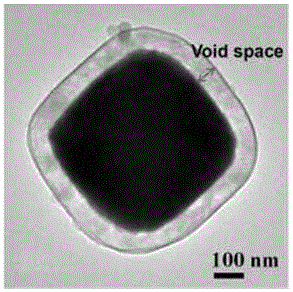Preparation method of yolk-eggshell structured nitrogen-doped carbon-coated Fe3O4@SnO2 magnetic nanometer box
A technology of carbon-coated ferroferric oxide and magnetic nanometers, which is applied in nanotechnology, nanotechnology, structural parts, etc., can solve problems such as poor rate characteristics and cycle performance, limited commercial applications, and large volume effects, and achieves Good shape control, excellent cycle stability, and the effect of mitigating volume effects
- Summary
- Abstract
- Description
- Claims
- Application Information
AI Technical Summary
Problems solved by technology
Method used
Image
Examples
Embodiment 1
[0027] 1. Preparation of Fe2O3 nanocubes:
[0028] Dissolve 80 mg of ferric chloride hexahydrate and 40 mg of solid sodium hydroxide in 90 mL of deionized water, mix well at 25 °C and transfer to a 150 mL polytetrafluoroethylene-lined hydrothermal reactor. Reaction at 100°C for 24h. After the reaction was completed, the reaction kettle was taken out, the red product was centrifuged and washed three times with deionized water and absolute ethanol, and finally dried in a vacuum drying oven for 12 hours. The resulting product is ferric oxide nanocubes.
[0029] 2. Preparation of core-shell structure ferric oxide@silica nanocubes:
[0030] Ultrasonically disperse 100 mg of the above-mentioned ferric oxide nano-cubic in 70 mL of absolute ethanol, and then add 6.5 mL of deionized water, 15 mg of ammonia water and 30 mg of tetraethyl orthosilicate (TEOS) in turn after the dispersion is uniform, at 30 °C Reacted for 2 h in a water bath. After the reaction, the product was centrifu...
Embodiment 2
[0036] 1. Preparation of Fe2O3 nanocubes:
[0037] Dissolve 80 mg of ferric chloride hexahydrate and 80 mg of solid sodium hydroxide in 90 mL of deionized water, mix well at 25°C and transfer to a 150 mL polytetrafluoroethylene-lined hydrothermal reaction kettle , 150°C for 36 h. After the reaction was over, the reaction kettle was taken out, the red product was centrifuged and washed three times with deionized water and absolute ethanol, and finally dried in a vacuum oven for 12 h. The resulting product is ferric oxide nanocubes.
[0038] 2. Preparation of core-shell structure ferric oxide@silica nanocubes:
[0039] Ultrasonically disperse 100 mg of the above-mentioned ferric oxide nanocubes in 70 mL of absolute ethanol, and after the dispersion is uniform, add 6.5 mL of deionized water, 18 mg of ammonia water and 50 mg of tetraethyl orthosilicate (TEOS), at 50 °C The reaction was carried out in a water bath for 6h. After the reaction, the product was centrifuged and washed...
Embodiment 3
[0045] 1. Preparation of Fe2O3 nanocubes:
[0046] Dissolve 80 mg of ferric chloride hexahydrate and 160 mg of solid sodium hydroxide in 90 mL of deionized water, mix well at 25 °C and transfer to a 150 mL polytetrafluoroethylene-lined hydrothermal reactor. Reaction at 180°C for 48h. After the reaction was over, the reaction kettle was taken out, the red product was centrifuged and washed three times with deionized water and absolute ethanol, and finally dried in a vacuum oven for 12 h. The resulting product is ferric oxide nanocubes.
[0047] 2. Preparation of core-shell structure ferric oxide@silica nanocubes:
[0048] Ultrasonically disperse 100 mg of the above-mentioned ferric oxide nanocubes in 70 mL of absolute ethanol, and after the dispersion is uniform, add 6.5 mL of deionized water, 80 mg of ammonia water and 200 mg of tetraethyl orthosilicate (TEOS) in sequence, at 80 °C Reacted for 12 h under water bath condition. After the reaction, the product was centrifuged...
PUM
| Property | Measurement | Unit |
|---|---|---|
| Particle size | aaaaa | aaaaa |
| Thickness | aaaaa | aaaaa |
| Thickness | aaaaa | aaaaa |
Abstract
Description
Claims
Application Information
 Login to View More
Login to View More - R&D
- Intellectual Property
- Life Sciences
- Materials
- Tech Scout
- Unparalleled Data Quality
- Higher Quality Content
- 60% Fewer Hallucinations
Browse by: Latest US Patents, China's latest patents, Technical Efficacy Thesaurus, Application Domain, Technology Topic, Popular Technical Reports.
© 2025 PatSnap. All rights reserved.Legal|Privacy policy|Modern Slavery Act Transparency Statement|Sitemap|About US| Contact US: help@patsnap.com



